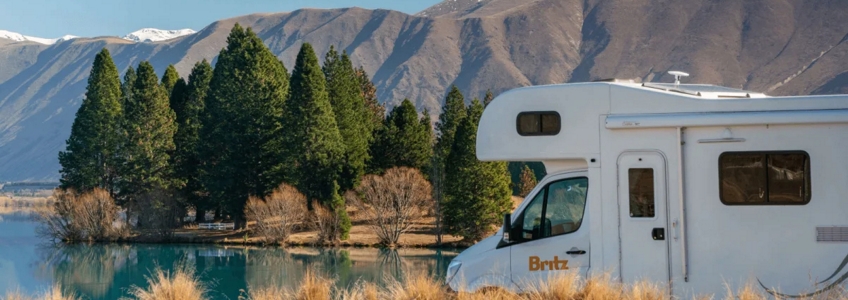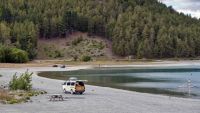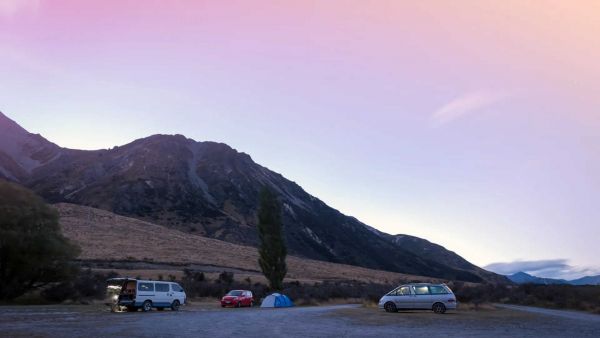New Zealand is one of the most beautiful countries in the world, and its small size and accessibility make it the perfect destination for a motorhome road trip!
Fortunately, New Zealand makes it easy to experience its natural wonders by campervan, thanks to what we Kiwis call freedom camping. Designated public lands are available for use by freedom campers, opening a world of possibilities, but laws vary by region, and strict rules always apply.
Do you know where you can and can't pull up the parking brake and lay down your head in New Zealand? Continue reading to learn more about where you can park your campervan in New Zealand.
Can I Park My Campervan Anywhere in New Zealand?
When we talk about parking your campervan rental, we're typically talking about where you can pitch up and sleep for the night. While you can park your campervan as you would a car or truck, in designated parking spots anywhere in the country, you can't sleep in your campervan just anywhere. This means that while police will move you along if you try to sleep in your campervan at a metred parking space in downtown Auckland, you're almost never more than an hour away from a scenic designated camping site.
Some public lands like DOC (Department of Conservation) campsites are freely available to tents, vans, and motorhomes, as are privately-owned holiday parks. Other sites, typically designated as freedom camping areas, require your campervan to be certified self-contained.
Is Your Campervan Self-Contained?
Historically, the New Zealand government has required self-contained campervans to have certain features to ensure that individuals could live in the vehicle for several days. These features included both fixed and portable toilets as well as potable water tanks. Campervans meeting these standards received a blue certified self-contained warrant card, granting access to designated freedom camping sites.
Upcoming Changes in Self-Containment Certification in 2024
In 2024, New Zealand is updating the self-containment certification laws, raising the standards and making the certification process more stringent. The significant changes include replacing the blue self-containment warrant card with a green one and requiring campervans to have fixed toilets, as portable toilets will no longer meet the new requirements. This update aims to reduce counterfeiting by adding certifications to a nationwide registry and ensuring higher environmental protection standards.
Penalties for Parking Non-Compliance
Self-contained vehicles are allowed to park in designated camping areas within regional parks, which require booking and payment in advance. However, parking without the proper certification can lead to severe penalties, including fines, towing, and even the suspension or revocation of the vehicle's certification. Adhering to parking regulations is important to avoid these penalties and maintain responsible camping practices. Our friendly professionals at New Zealand Motorhomes can let you know if the motorhome you're considering is self-contained. Simply give us a call.
Types of Campsites and Parking Areas
The key differences between DOC (Department of Conservation) campsites, holiday parks/private campgrounds, and designated freedom camping spots in New Zealand lie in their facilities, regulations, costs, and locations:
DOC Campsites
- Facilities: Offer basic amenities like toilets, water supply, and picnic tables. They can range from basic to serviced campsites with varying levels of facilities.
- Price: Typically more affordable than holiday parks, with free or low-cost camping options.
- Locations: Situated in scenic areas like national parks and conservation zones.
Holiday Parks/Private Campgrounds
- Facilities: Provide a wide range of amenities such as hot showers, kitchens, laundry services, and sometimes Wi-Fi. They offer a more comfortable camping experience.
- Price: Generally more expensive than DOC campsites but offer more conveniences.
- Locations: Found in various locations across New Zealand, including popular tourist destinations.
Designated Freedom Camping Spots
- Regulations: Subject to local council rules and regulations. Only certified self-contained vehicles are usually allowed for freedom camping.
- Facilities: Minimal to no facilities are provided at these spots.
- Locations: Often in remote or public lands outside of designated campsites, offering a more secluded and self-sufficient camping experience.
Understanding these distinctions can help campers choose the type of camping experience that best suits their preferences, budget, and desired level of comfort while exploring the beautiful landscapes of New Zealand.
Understanding the Rules and Regulations
Camping rules and regulations in New Zealand vary across local councils, leading to a diverse landscape of guidelines for freedom camping. Each council has its own set of bylaws that dictate where and how freedom camping is allowed within their jurisdiction. Here is a breakdown of how some of these rules differ.
Noteworthy Council Bylaws
- Whangārei District Council: Actively encourages responsible freedom camping, offering access to amenities like clean public toilets, showers, and free Wi-Fi, even allowing tent campers to spend the night.
- Queenstown Lakes District Council: Has introduced highly restrictive freedom camping bylaws, making it challenging to determine legal camping areas with cryptic maps of off-limits zones.
Certification Requirements
- Self-Contained Vehicles: In most regions, freedom camping is only permitted in vehicles certified as "self-contained," which can meet the ablutionary and sanitary needs of occupants for a minimum of three days without external services or waste discharge.
- Changes: As of December 7, 2023, only vehicles with fixed toilets are certified as self-contained, with higher standards for water and ventilation systems enforced.
Environmental Concerns
- Legislation Changes: Due to concerns about over-tourism and environmental impact, New Zealand has updated its freedom camping laws to address issues like garbage disposal and negative environmental effects caused by freedom campers.
- Sustainable Tourism: The new laws aim to balance the freedom of camping with responsible environmental stewardship, ensuring campers respect and preserve New Zealand's natural landscapes.
Local Support and Infrastructure
- Variability: Regional attitudes towards freedom campers vary widely, with some councils actively supporting responsible freedom camping by providing facilities, while others have introduced strict bylaws to manage camping activities.
- Resources: Campers are advised to use resources like apps to find legal campsites, understand requirements, and ensure compliance with local regulations.
The Perfect Campervan Puts New Zealand at Your Feet
Knowing where to park is key to experiencing the magic of New Zealand. Knowing what to park is more important still! At New Zealand Motorhomes, you can find the perfect campervan to suit your party size and appetite for adventure. Our friendly, professional staff will offer helpful insights as you plan your Kiwi campervan excursion. Browse motorhomes today, and let us know if you have any questions!



